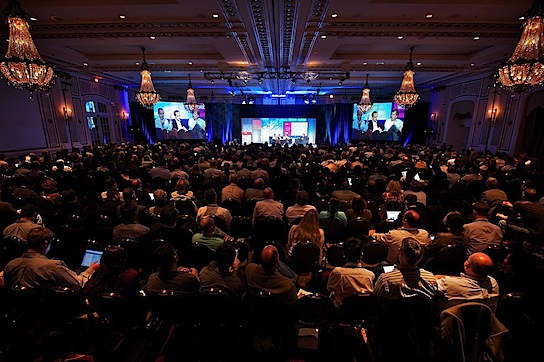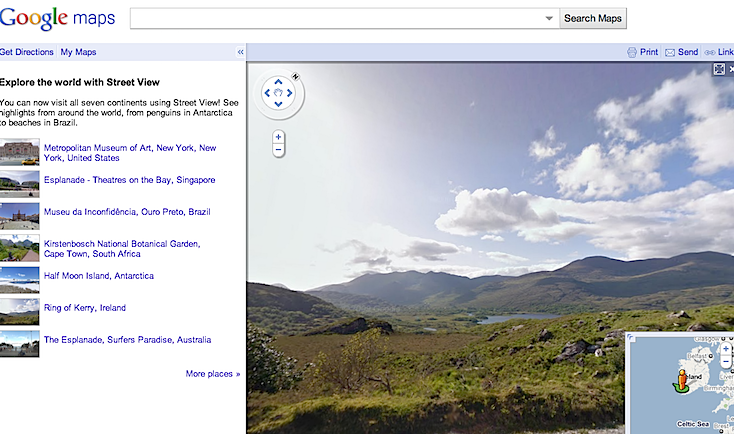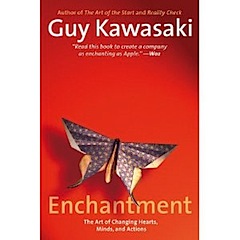Announcing Web 2 Summit 2011: The Data Frame

If you've been reading my musings these past few months, you may have noticed an increasing fascination with data. Who owns it (the creator, the service, both? Who has access to it - ISPs? Device makers? Marketers? The government? And how are we as an industry leveraging data to create entirely new classes of services?
Well, expect a lot more musing here, because (finally!) we're ready to announce the theme for the Web 2 Summit, 2011, and it's this: The Data Frame. From my overview, just posted on the site:
For Summit 2010, we noted that the Web ecosystem had shifted into something of a battlefield, with both major players and upstarts jockeying for lead positions around key “Points of Control.” Looking back at our theme one year later, it’s clear the game is still in its early phases – most of the major players have held their ground and continue to press into new territory. Meanwhile, the cycle of startup creation has intensified and compressed.
Given all this, we’re tempted to simply declare 2011 “Points of Control, The Sequel.” But we’ve noticed a constant uniting nearly all the battles around these strategic regions. That constant? How companies (and their customers) leverage data.
In our original Web 2.0 opening talk, as well as in Tim’s subsequent paper “What is Web 2.0,” we outlined our short list of key elements defining the emergent web economy. Smack in the middle of that list is this statement: “Data Is the Next Intel Inside.” At the time, most of us only vaguely understood the importance of this concept. Three years ago we noted the role of data when “Web Meets World,” and two years ago, we enlarged upon it with “WebSquared.”
This year, data has taken center stage in the networked economy. We live in a world clothed in data, and as we interact with it, we create more – data is not only the web’s core resource, it is at once both renewable and infinite. No longer tethered to the PC, each of us bathes in a continuous stream of data, in real time, nearly everywhere we go.
In the decade since search redefined how we consume information, we have learned to make the world a game and the game our world, to ask and answer “what’s happening,” “what’s on your mind,” and “where are you?” Each purchase, search, status update, and check-in layers our world with data. Billions of times each day, we pattern a world collectively created by Twitter, Zynga, Facebook, Tencent, Foursquare, Google, Tumblr, Baidu, and thousands of other services. The Database of Intentions is scaling to nearly incomprehensible size and power.
Of course, this fact raises serious issues of consumer privacy, corporate trust, and our governments’ approach to balancing the two. As we learn to leverage this ever-shifting platform called the Internet, we are at once renegotiating our social, economic, and cultural relationships – and we’re doing it in real time. How we interact with each other, how we engage with our government, how we conduct business, and even how we understand our place in the world – all has changed in the short two decades since the dawn of the commercial Internet. And all of this is described through a matrix of data, the power of which our culture is only beginning to recognize.
At the Web 2 Summit 2011, we’ll use data as a framing device to understand the state of the web. We know that those who best leverage data will win. So who’s winning, and how? Who’s behind? In each of our key points of control such as location, mobile platforms, gaming, content, social – who is innovating, and where are the opportunities? What new classes of services and platforms are emerging, and what difficult policy questions loom? And what of the consumer – will users become their own “point of control,” and start to understand the power of their own data?
These are some of the questions we’ll be asking and answering at the 8th annual Web 2 Summit. We look forward to exploring them together.
Web 2 Summit 2011
The Palace Hotel San Francisco
Oct. 17-19, 2011
* And yes, we’ll be updating our “Points of Control” Map with a new layer – the Data layer, naturally.

 Herewith and below:
Herewith and below:
 Federated Media is proud to present the sixth annual Conversational Marketing Summit, June 6-7 at the fabulous Hudson Theater in the Millennium Broadway Hotel in Times Square. The preliminary agenda is now up, more is coming, but you can get a pretty good sense of the lineup - it's amazing.
Federated Media is proud to present the sixth annual Conversational Marketing Summit, June 6-7 at the fabulous Hudson Theater in the Millennium Broadway Hotel in Times Square. The preliminary agenda is now up, more is coming, but you can get a pretty good sense of the lineup - it's amazing. Quantcast, Demand Media, Facebook, Outbrain, Pandora, R2integrated, Slideshare, Yahoo!, AOL, Mobile Roadie, Spiceworks, Ustream; and our partners: IAB, Mashable, SMAC, and paidContent.
Quantcast, Demand Media, Facebook, Outbrain, Pandora, R2integrated, Slideshare, Yahoo!, AOL, Mobile Roadie, Spiceworks, Ustream; and our partners: IAB, Mashable, SMAC, and paidContent.

















